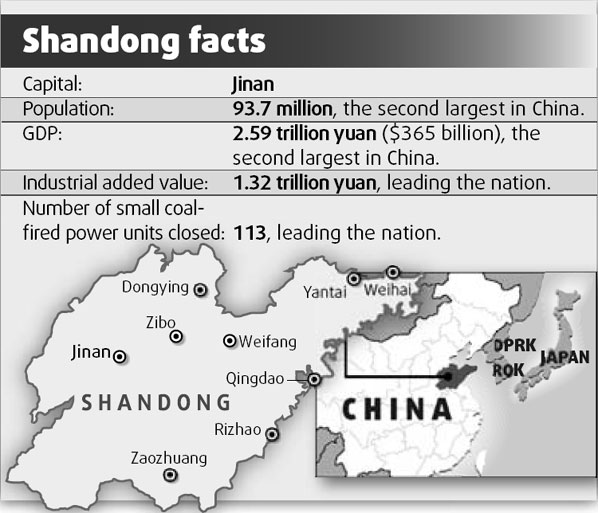 |
|
It's green or bust for Shandong governor
By Xing Zhigang (China Daily) Updated: 2008-03-17 07:06
Shandong governor Jiang Daming has put his political career on the line by linking his fortunes to the province's success in achieving green goals. He said the green accountability system for local government chiefs will be a crucial tool in achieving the national goal of reducing energy consumption and pollution. "As head of the provincial government, I will voluntarily step down if my province falls short of the target," the governor said in an interview with China Daily. "My intent is to tell myself and my colleagues that we have to fight to win or die." China has set a target of reducing energy consumption per unit of GDP by 20 percent and the total volume of major pollutant discharges by 10 percent between 2006 and 2010.
Shandong is committed to reducing energy consumption per unit of GDP by 4.5 percent and the total volume of major pollutant discharges by 4 percent this year. Although the central government has signed contracts with provincial governments obliging them to agree to accept punishment if they fail to meet their green goals, Jiang is one of the few leaders to willingly put his job on the line. And what a bet it could be. The industrial eastern province of Shandong has a huge hunger for energy and suffers from heavy industrial pollution. Last year, industrial output accounted for 57.1 percent of the province's gross domestic product of 2.58 trillion yuan ($365 billion), rising by 14.3 percent year-on-year. What's worse, a large proportion of Shandong's industries are energy intensive and big polluters. "Despite our fast economic growth, we have succeeded in sharply cutting energy consumption and major pollutant discharges (according to initial estimates)," Jiang said. He was referring the province's reduction of sulfur dioxide emissions by 7.12 percent and Chemical Oxygen Demand by 5.04 percent. Last year, the province closed thermal power plants with a combined generating capacity of 17.1 million kw, steel and iron plants with an annual production capacity of 4 million tons of steel and cement factories with an annual production capacity of 8.7 million tons of cement, Jiang said. "(Cutting back on such industries) has brought more benefits than damage to our economy, so we have no reason to slow down our efforts in this field," Jiang said. He said Shandong will focus on developing more renewable power sources, such as solar and wind power, bio-energy and terrestrial heat to reduce its reliance on thermal power. The governor said work has started on the province's first nuclear power plant in Haiyang county, Yantai. It will have a generation capacity of 7.5 million kw and will be put into operation in 2014.  (China Daily 03/17/2008 page6) |
|